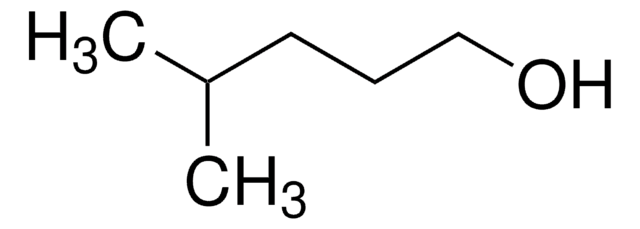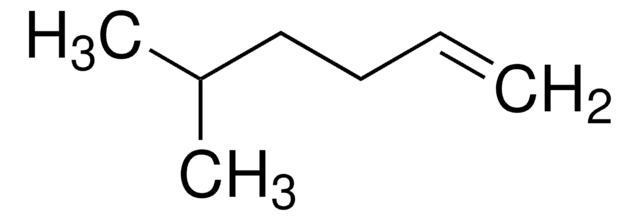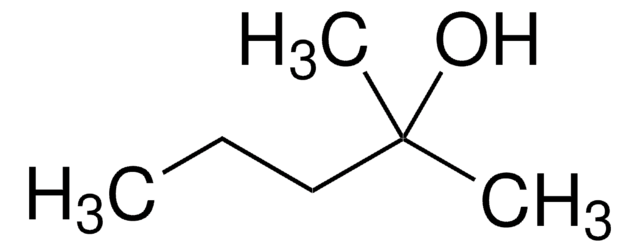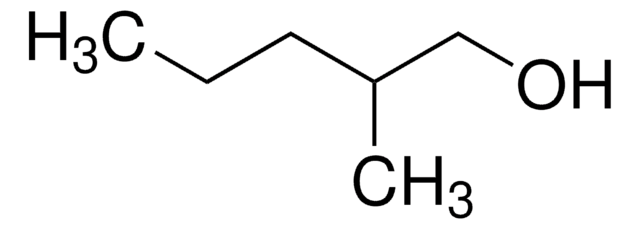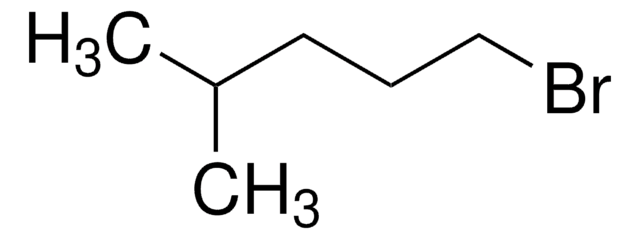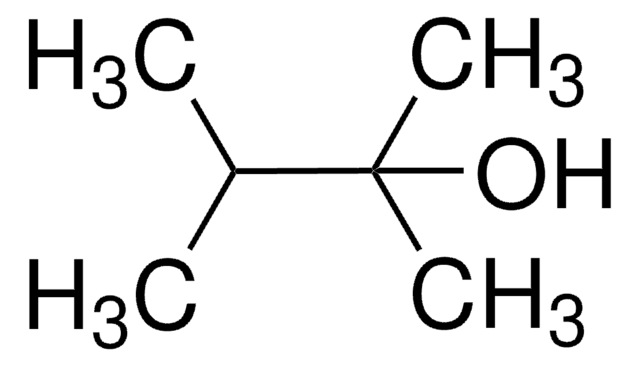493953
5-Methyl-1-hexanol
97%
Sinónimos:
5-Methylhexanol
Iniciar sesiónpara Ver la Fijación de precios por contrato y de la organización
About This Item
Fórmula lineal:
(CH3)2CH(CH2)4OH
Número de CAS:
Peso molecular:
116.20
EC Number:
MDL number:
UNSPSC Code:
12352100
PubChem Substance ID:
NACRES:
NA.22
Productos recomendados
Quality Level
assay
97%
refractive index
n20/D 1.422 (lit.)
bp
167-168 °C (lit.)
density
0.823 g/mL at 25 °C (lit.)
functional group
hydroxyl
SMILES string
CC(C)CCCCO
InChI
1S/C7H16O/c1-7(2)5-3-4-6-8/h7-8H,3-6H2,1-2H3
InChI key
ZVHAANQOQZVVFD-UHFFFAOYSA-N
Categorías relacionadas
General description
5-Methyl-1-hexanol, an aliphatic alcohol, can be prepared by the reduction of 5-methylhexanoic acid. It is predicted to have a fruity odor based on fuzzy partition and self organising maps (SOM) analysis data.
5-Methyl-1-hexanol is a volatile organic compound found in:
5-Methyl-1-hexanol is a volatile organic compound found in:
- Alstonia boonei leaves
- ‘Hayward′ and ‘Hort16A′ kiwifruit
- Tuber melanosporum fruiting body
signalword
Warning
hcodes
Hazard Classifications
Acute Tox. 4 Oral - Flam. Liq. 3 - Skin Irrit. 2
Storage Class
3 - Flammable liquids
wgk_germany
WGK 3
flash_point_f
86.0 °F
flash_point_c
30 °C
Elija entre una de las versiones más recientes:
¿Ya tiene este producto?
Encuentre la documentación para los productos que ha comprado recientemente en la Biblioteca de documentos.
Los clientes también vieron
Coralia V Garcia et al.
Food chemistry, 137(1-4), 45-54 (2012-12-04)
Bound volatiles are recognised as a potential source of aroma compounds in fruits. In this study, the bound volatiles of Actinidia deliciosa 'Hayward' and A. chinensis 'Hort16A' were studied at three different ripening stages. The bound volatile content tended to
Prediction of odours of aliphatic alcohols and carbonylated compounds using fuzzy partition and self organising maps (SOM).
Audouze K, et al.
Analusis, 28(7), 625-632 (2000)
Nicolas Durand et al.
PloS one, 6(12), e29147-e29147 (2012-01-05)
Odorant-Degrading Enzymes (ODEs) are supposed to be involved in the signal inactivation step within the olfactory sensilla of insects by quickly removing odorant molecules from the vicinity of the olfactory receptors. Only three ODEs have been both identified at the
Nicolas Durand et al.
PloS one, 5(11), e15026-e15026 (2010-12-03)
Carboxyl/cholinesterases (CCEs) are highly diversified in insects. These enzymes have a broad range of proposed functions, in neuro/developmental processes, dietary detoxification, insecticide resistance or hormone/pheromone degradation. As few functional data are available on purified or recombinant CCEs, the physiological role
GC-MS evaluation of bioactive compounds and antibacterial activity of the oil fraction from the leaves of Alstonia boonei De Wild.
Okwu DE and Ighodaro BU.
Der Pharma Chemica, 2(1), 261-262 (2010)
Nuestro equipo de científicos tiene experiencia en todas las áreas de investigación: Ciencias de la vida, Ciencia de los materiales, Síntesis química, Cromatografía, Analítica y muchas otras.
Póngase en contacto con el Servicio técnico